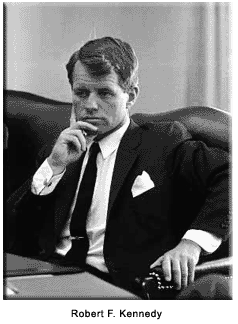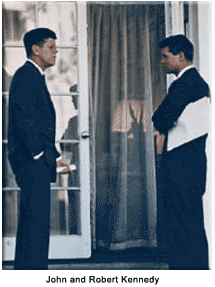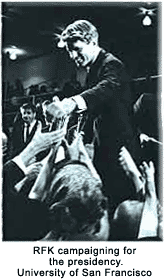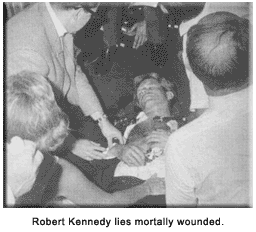On June 6, 1968, an assassin`s bullet not only prematurely ended the life of Robert Francis Kennedy, the politician, but Kennedy the father, and Kennedy the potential statesman who was passionate about a number of global and national issues.
Kennedy, who had originally supported a growing U.S. involvement in Vietnam, became convinced that the war should come to an end by negotiated settlement. He called for inclusion of the alienated North Vietnamese National Liberation Front as a part of a political process and end what was, in his view, a civil war.
Kennedy, as the attorney general in the John F. Kennedy cabinet, was a strident proponent of human rights, not only in America, but throughout the world.
 His third objective, as U.S Senator, was to introduce legislation to remedy poverty and hunger. He had visited the Mississippi Delta, Appalachia, and urban ghettoes and saw children with "bellies swollen with hunger," children unable to go to school for lack of clothes or shoes.
Kennedy spoke three words following the assassin`s shots: "Is everybody okay?"
The early years
"Bobby" was born in the Boston suburb of Brookline, Massachusetts, in November 1925, to Joseph P. and Rose Kennedy. He later remarked, "I was the seventh of nine children, and when you come from that far down, you have to struggle to survive."
He attended Milton Academy as a youth and, after a brief stint in the U.S. Navy Reserves just after World War II, was graduated from Harvard in 1948. Although he was denied admission to Harvard Law School, Kennedy earned his law degree from the University of Virginia School of Law in 1951.
Kennedy married Ethel Skakel in 1950. They would go on to rear a brood of 11.
The political scene
Bobby didn`t have to wait too long after graduation to jump into politics. His brother, John, asked Bobby to handle his campaign for the U.S. Senate.
Shortly after a successful campaign, Bobby joined the staff of Joseph McCarthy, who chaired the Senate Subcommittee on Investigations. Kennedy conducted a probe into allegations that Allies-turned-traitors were shipping goods to Communist China and that those traitors, as often implied by McCarthy, were the real U.S. foreign policy makers — during the Cold War when such actions were considered taboo.
Kennedy found the accusations to be only partly true — that the overseas "traitors-running-our-country" scenario was far-fetched. He soon left the staff, joined the Democratic minority as chief counsel on the same committee, and wrote a scathing report that chastised McCarthy for claiming that there were communists in the U.S. Army.
Kennedy`s reputation as a pit bull-style investigator reached the national stage when he lit into Teamsters Union leaders Jimmy Hoffa and David Beck, over corruption issues.
On to the White House
After guiding John F. Kennedy`s presidential campaign to a slender victory in 1960, Bobby was named the U.S. Attorney General. He immediately went after Organized Crime.
Bobby also used his position to speak out about civil rights, specifically the rights of African Americans to vote, attend school, and use public facilities.
His third objective, as U.S Senator, was to introduce legislation to remedy poverty and hunger. He had visited the Mississippi Delta, Appalachia, and urban ghettoes and saw children with "bellies swollen with hunger," children unable to go to school for lack of clothes or shoes.
Kennedy spoke three words following the assassin`s shots: "Is everybody okay?"
The early years
"Bobby" was born in the Boston suburb of Brookline, Massachusetts, in November 1925, to Joseph P. and Rose Kennedy. He later remarked, "I was the seventh of nine children, and when you come from that far down, you have to struggle to survive."
He attended Milton Academy as a youth and, after a brief stint in the U.S. Navy Reserves just after World War II, was graduated from Harvard in 1948. Although he was denied admission to Harvard Law School, Kennedy earned his law degree from the University of Virginia School of Law in 1951.
Kennedy married Ethel Skakel in 1950. They would go on to rear a brood of 11.
The political scene
Bobby didn`t have to wait too long after graduation to jump into politics. His brother, John, asked Bobby to handle his campaign for the U.S. Senate.
Shortly after a successful campaign, Bobby joined the staff of Joseph McCarthy, who chaired the Senate Subcommittee on Investigations. Kennedy conducted a probe into allegations that Allies-turned-traitors were shipping goods to Communist China and that those traitors, as often implied by McCarthy, were the real U.S. foreign policy makers — during the Cold War when such actions were considered taboo.
Kennedy found the accusations to be only partly true — that the overseas "traitors-running-our-country" scenario was far-fetched. He soon left the staff, joined the Democratic minority as chief counsel on the same committee, and wrote a scathing report that chastised McCarthy for claiming that there were communists in the U.S. Army.
Kennedy`s reputation as a pit bull-style investigator reached the national stage when he lit into Teamsters Union leaders Jimmy Hoffa and David Beck, over corruption issues.
On to the White House
After guiding John F. Kennedy`s presidential campaign to a slender victory in 1960, Bobby was named the U.S. Attorney General. He immediately went after Organized Crime.
Bobby also used his position to speak out about civil rights, specifically the rights of African Americans to vote, attend school, and use public facilities.
 In a speech at the University of Georgia Law School in 1961, Kennedy declared, "I happen to believe that the 1954 decision [of the Supreme Court] to negate school segregation was right. But my belief does not matter. It is the law. Some of you may believe the decision was wrong. It does not matter. It is the law."
In September 1962, President Kennedy sent U.S. marshals and armed troops to enforce a federal court order to admit James Meredith to the University of Mississippi — the first African American to matriculate there. A riot ensued, which left two dead and hundreds injured.
The attorney general shared a vision with the president that voting was a means to the solution of racial injustice. Together they introduced the most sweeping piece of civil rights legislation since the Civil War and Reconstruction — the Civil Rights Act of 1964, which was passed after the death of President Kennedy in 1963.
In October 1962, the Soviet Union began to install nuclear missiles on Cuba, which precipitated the Cuban Missile Crisis. The U.S. attorney general helped to formulate the Kennedy administration`s strategy to "quarantine" Cuba, rather than take direct military action — which might have plunged the planet into World War III. He also helped to negotiate the removal of those missiles by the Soviet Union.
Bobby the politician
After the death of President Kennedy, Robert stepped down as attorney general to run for the U.S. Senate from the state of New York in 1964. This predictably brought cries of "carpetbagger" from the Republican opponent and incumbent, Kenneth Keating.
Kennedy brushed aside the verbal assault with a sense of humor, saying, in part, that, "My father has done very well and I could have lived off him." He went on to say, "I`d just like to be a good United States Senator. I`d like to serve."
Despite simmering personal differences, President Lyndon B. Johnson campaigned for Kennedy (in the Senate race), — who won by a landslide.
In a speech at the University of Georgia Law School in 1961, Kennedy declared, "I happen to believe that the 1954 decision [of the Supreme Court] to negate school segregation was right. But my belief does not matter. It is the law. Some of you may believe the decision was wrong. It does not matter. It is the law."
In September 1962, President Kennedy sent U.S. marshals and armed troops to enforce a federal court order to admit James Meredith to the University of Mississippi — the first African American to matriculate there. A riot ensued, which left two dead and hundreds injured.
The attorney general shared a vision with the president that voting was a means to the solution of racial injustice. Together they introduced the most sweeping piece of civil rights legislation since the Civil War and Reconstruction — the Civil Rights Act of 1964, which was passed after the death of President Kennedy in 1963.
In October 1962, the Soviet Union began to install nuclear missiles on Cuba, which precipitated the Cuban Missile Crisis. The U.S. attorney general helped to formulate the Kennedy administration`s strategy to "quarantine" Cuba, rather than take direct military action — which might have plunged the planet into World War III. He also helped to negotiate the removal of those missiles by the Soviet Union.
Bobby the politician
After the death of President Kennedy, Robert stepped down as attorney general to run for the U.S. Senate from the state of New York in 1964. This predictably brought cries of "carpetbagger" from the Republican opponent and incumbent, Kenneth Keating.
Kennedy brushed aside the verbal assault with a sense of humor, saying, in part, that, "My father has done very well and I could have lived off him." He went on to say, "I`d just like to be a good United States Senator. I`d like to serve."
Despite simmering personal differences, President Lyndon B. Johnson campaigned for Kennedy (in the Senate race), — who won by a landslide.
 Not one to be still, the fledgling senator introduced several social programs throughout the state, including help for students with disabilities and underprivileged children. He fought tirelessly to raise the consciousness of Americans concerning extreme poverty in America— the "superpower" that couldn`t take care of its own.
"These conditions," he said, "are not confined to rural [areas]. They exist in dark Tenements . . . within sight of the Capitol, in Harlem, in South Side Chicago, in Watts. There are children in these areas who have never been to school, never been to a doctor or a dentist. There are children who have never heard conversation in their homes, never read or even seen a book."
Kennedy also sought to advance the worldwide cause of human rights. In a 1966 speech before South African students, he declared:
Not one to be still, the fledgling senator introduced several social programs throughout the state, including help for students with disabilities and underprivileged children. He fought tirelessly to raise the consciousness of Americans concerning extreme poverty in America— the "superpower" that couldn`t take care of its own.
"These conditions," he said, "are not confined to rural [areas]. They exist in dark Tenements . . . within sight of the Capitol, in Harlem, in South Side Chicago, in Watts. There are children in these areas who have never been to school, never been to a doctor or a dentist. There are children who have never heard conversation in their homes, never read or even seen a book."
Kennedy also sought to advance the worldwide cause of human rights. In a 1966 speech before South African students, he declared:
"[People] who strike out against injustice show the highest form of courage. Each time a man stands up for an ideal, or acts to improve the lot of others, he sends forth a tiny ripple of hope, and crossing each other from a million different centers of energy and daring, those ripples build up a current that can sweep down the mightiest walls of oppression and resistance."Kennedy became vocal about ending the Vietnam War. He exhorted President Johnson to stop bombing North Vietnam. "Are we like the God of the Old Testament," he asked in his last speech on Vietnam to the U.S. Senate, "that we can decide, in Washington, D.C., what cities, what towns, what hamlets are going to be destroyed? Do we have to accept that? I do not think we have to. I think we can do something about it." The beginning of the end After witnessing President Johnson`s razor-thin victory over anti-Vietnam War contender Eugene McCarthy in the New Hampshire primary, Robert Kennedy threw in his hat for the Democratic presidential nomination. At the politically young age of 42, Kennedy`s campaign spoke to the young and disenfranchised as well as the old guard. His upbeat message sought to shake up the status quo, bridge the gaps between races, between rich and poor, to unite Americans as a country.
 His impassioned speeches led to critical victories in the primaries of Indiana and Nebraska, and, on June 5, in California. The hopes and dreams of "one America" were beginning to be realized. A groundswell of support had surged.
Sirhan Sirhan, a young man of Palestinian descent, changed all that. Following a victory gathering of supporters and campaign volunteers at the Ambassador Hotel in Los Angeles, Sirhan gunned down Senator Kennedy in the kitchen.
Kennedy was buried just a few steps from his brother, John, in Arlington National Cemetery, during a private ceremony.
His impassioned speeches led to critical victories in the primaries of Indiana and Nebraska, and, on June 5, in California. The hopes and dreams of "one America" were beginning to be realized. A groundswell of support had surged.
Sirhan Sirhan, a young man of Palestinian descent, changed all that. Following a victory gathering of supporters and campaign volunteers at the Ambassador Hotel in Los Angeles, Sirhan gunned down Senator Kennedy in the kitchen.
Kennedy was buried just a few steps from his brother, John, in Arlington National Cemetery, during a private ceremony.
"The [next] priority for change — the first element of a new politics for the United States — is in our policy toward the world. Too much and for too long, we have acted as if our great military might and wealth could bring about an American solution to every world problem..."
-Robert F. Kennedy, 1968 "Few will have the greatness to bend history, but each of us can work to change a small portion of events, and in the total of all those acts will be written the history of this generation."
- RFK, 1966